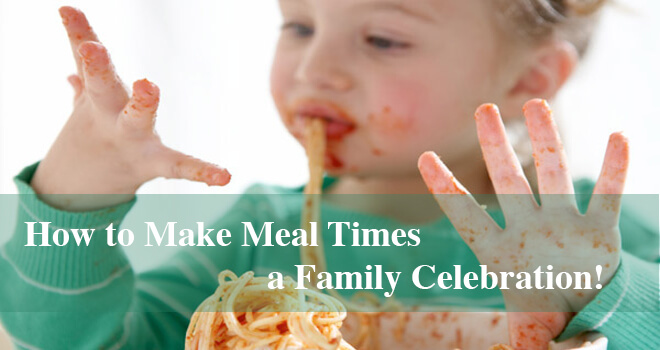Happy and Healthy Eating!
Give the Family Meal the attention it deserves
Week-ends can be a time to take a break and spend some quiet time at home. Whether or not you are planning a low key week-end or having a crowd around your table , the stress of “how can I get my child to eat?” can put a damper on your mood. The good news is that the family meal is a time to celebrate your lives together and take advantage of many “teachable moments”.
Join me as we give the family meal the attention it deserves.
- If you want your child to stay with you at the table, make it enjoyable.
- Create a party atmosphere rather than a lecture time.
No matter the age the temptation is to keep coaxing them to eat more, to try new foods, to sit still, chew with your mouth closed, say please, say thank-you and get back on your chair! Sound familiar?
Toddlers cannot be expected to sit for longer than 5 minutes. If you have a child that does, then that’s great. If your child is the one with only one inch of body parts on the seat then enjoy the time they are with you. Eventually your presence and positive attitude will draw them closer and they will be able to sit for longer periods of time.
- Never force a child to eat the foods they do not want. Instead, keep offering these foods over and over again. Exposure will lead them to become adventurous over time.
- Role model your own love for a variety of foods. You are such an important force in their lives, watching you eat broccoli with gusto is far more attractive than the constant nagging to eat your veggies!
- Role model your own good manners. Don’t expect a toddler to eat quietly and neatly. You can expect them to drop food, touch it, smell it and squeeze it. As you eat, little eyes are upon you and they will catch on. As they grow your expectations of what they can do can increase. A 2 year old may not be able to eat with their mouth closed but at 3 or 4 you can make it enjoyable by saying things like “let’s see how long we can chew with our mouths closed”.
- Role model “please and thank you.” We want children to experience that and not just say what they are told to say. This is how we teach them to think for themselves and not simply think what someone else is telling them. Please pass the ketchup to your spouse or other adult or child goes a long way.
- Don’t worry about food intake. Unless your paediatrician is worried about the growth of your child or there is some other related medical issue, allowing them to decide when they are done teaches them to listen to their bodies cues.
- It is perfectly normal for children to go through phases of favourite food. Not painful for them, very painful for us! If your child never eats any protein and favours the much beloved childhood foods of anything pasta, don’t worry. You can always initiate a fun filled protein night that draws children in rather than pushing them away or turning them off.
How can you celebrate and be the party people at the table?
- If you cannot gather several times a week, don’t worry. Have the nights you can carved out and try to be as consistent as possible.
- Serving family style has a lot of benefits. It allows children to choose the foods themselves, giving them power and authority to make their own choices and be in charge.
- Once a week or every second week have a special family dinner. You can choose to eat at a different table, or put a “fancy” cloth on the old one. You can buy flowers or decorate with children’s art. I love having children’s artwork in small frames. You can have them on the table and enjoy an in depth discussion, paying attention to small details.
- Allow children to help out in the kitchen. Even a toddler can mash a couple of potatoes.
- Children love to know they are important and valued members of the family. Giving them tasks tells them they are. Have them help set the table and then they can even clean up. Since they are too small to reach the kitchen sink, buy a small plastic tub where they can place all the dirty dishes.
- Ask questions that go beyond “what did you do in school today?” You can ask things like “do you think we will see the leaves growing on the trees by tomorrow? “Who can name all the colours in a rainbow?” You can also share stories of when you were small, you can talk about how pasta is made, where the broccoli they are eating comes from, how potatoes are grown and on…..
- When a child asks to leave the table, you will be ending on a more positive note when you say yes rather than forcing them to sit and squiggle and squirm. Chances are you will make them sit while you mini-lecture until you can’t stand to hear your voice anymore and you give in and say “go!” It is more effective to say “I’d love to speak with you some more, how about waiting until my chicken is done”. Be ready though for the answer to be no and don’t worry, with practice, developmental readiness and positive attitudes, you will be able to raise the bar on sitting time in no time!
Here are the benefits of creating a positive family celebration as we continue to embrace teachable moments:
- There will be lots of positive attention.
- Children will learn manners and make good decisions through role modelling.
- Cognitively and physically they will learn about new foods as they are exposed.
- Children will have awareness of their body’s signals and learn to eat when they are hungry and stop when they are full. What a great beginning to living a healthy life.
The whole family will benefit from the impact of gathering together, celebrating their time together and creating an experience of unity.
Happy and healthy eating!







